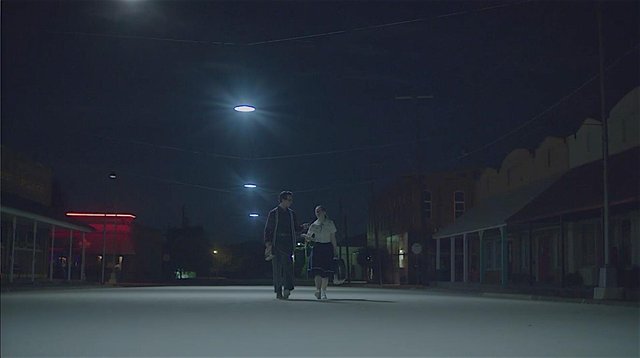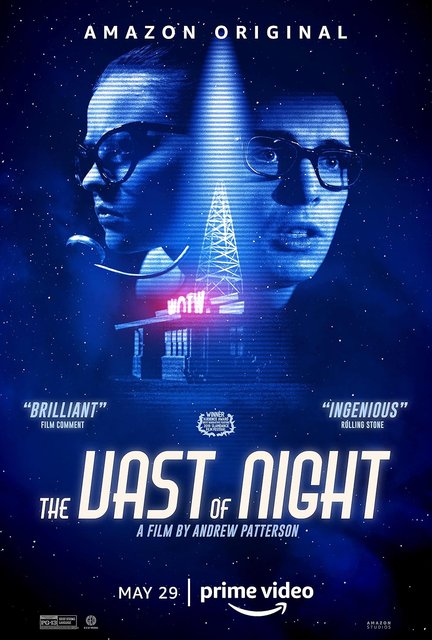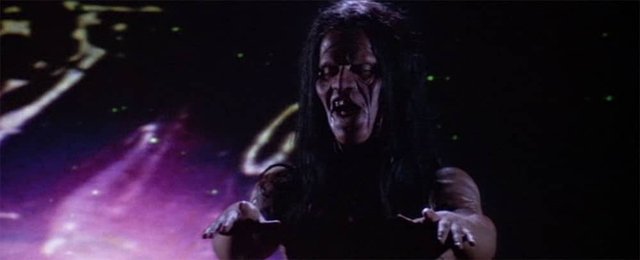
THE VAST OF NIGHT (2019)
Directed by : Andrew Patterson
Something of a potent mixture - the 1950s, paranoia, Twilight Zone sci-fi imagination, strange noises, mysterious stories and two characters with a gift for fantabulous dialogue. Those characters are the hip, free-wheeling Everett Sloan (Jake Horowitz) and the resourceful, eager-to-learn Fay Crocker (Sierra McCormick) who work to get to the bottom of the strange events occurring in the small town of Cayuga in New Mexico one night. Sloan works at a local radio station, WOTW, and 16-year-old Crocker finds herself working the switchboard when strange noises send them on an odyssey into the vast of night - urged on by stories told to them by an ex-military man and an elderly woman whose son once disappeared without a trace. Are the Soviets about to launch an invasion, or is there some other peril looming in the sky - some unknowable thing beyond our comprehension, and something we're powerless to confront? Our two intrepid seekers are determined to follow the clues and find out what's going on - fearful the fact that most people have gathered together for a local basketball game makes them especially vulnerable to attack. They're off into "a wondrous land whose boundaries are that of imagination."
There's an interesting framing device used in The Vast of Night - it makes everything that's happening an episode of a 'Twilight Zone'-type show on an old-style television, which transitions into a more modern colour image. Because the main body of the film feels more true-to-life than your average 50s/60s television show it means that there's this strange duality going on as we're constantly reminded that we're watching this 'show'. There's a tenuous connection being made between reality and our imagination, especially when that concerns solving mysteries. During one sequence when Everett and Fay talk, Fay mentions a bunch of articles she's read in science journals which postulate future life-changing inventions that will one day become the norm. With the benefit of hindsight, we know that none of them will actually come to pass - and that's pretty much a constant when it comes to predicting outcomes, despite our imagination. It alone can't provide answers - only investigation can. Imagination spurs us on and inspires us - and sometimes it's all about asking the right questions. Our imagination works hand-in-hand with our ability to inquire, test and observe reality.
The Vast of Night is a really well written sci-fi mystery - I was so impressed with the dialogue in this, which goes beyond drab necessity and adds a clever, inventive style all of it's own. Everett Sloan has an imaginative way with words, at times inventing his own smart twist when describing just about anything. Everett and and Fay are a lot of fun to listen to. In the meantime the period immersion feels very real - and that's one of the funny things about this being set up as an episode of a TV show, because it really doesn't feel like it is one. Instead it feels like that device is simply reminding us that this is a peek into our own imagination - into that dimension not only of sight and sound but mind. Remarkable, when you consider the assured direction in this that this is Andrew Patterson's first feature - leading a team that transformed Whitney, Texas into a period playground for a virtuoso audiovisual sci-fi odyssey. I also nearly forgot to mention how great the scene with old Mabel Blanche (Gail Cronauer) is - telling her strange story in monologue mode in a way that really gets under your skin, adding to the uneasy sense that this might be a mystery best left avoided by our determined duo. This was a movie good at getting under your skin - an imaginative sci-fi mystery out in 50s rural America where something may very well be out there.
Glad to catch this one - it's in Steven Jay Schneider's 1001 Movies You Must See Before You Die, and won/was nominated for dozens of international and domestic Film Festival and critics awards.

Watchlist Count : 427 (-23)
Next : Ponette (1996)
Next : Ponette (1996)
Thank you very much to whomever inspired me to watch The Vast of Night
__________________
Remember - everything has an ending except hope, and sausages - they have two.
Latest Review : The Mob (1951)





















